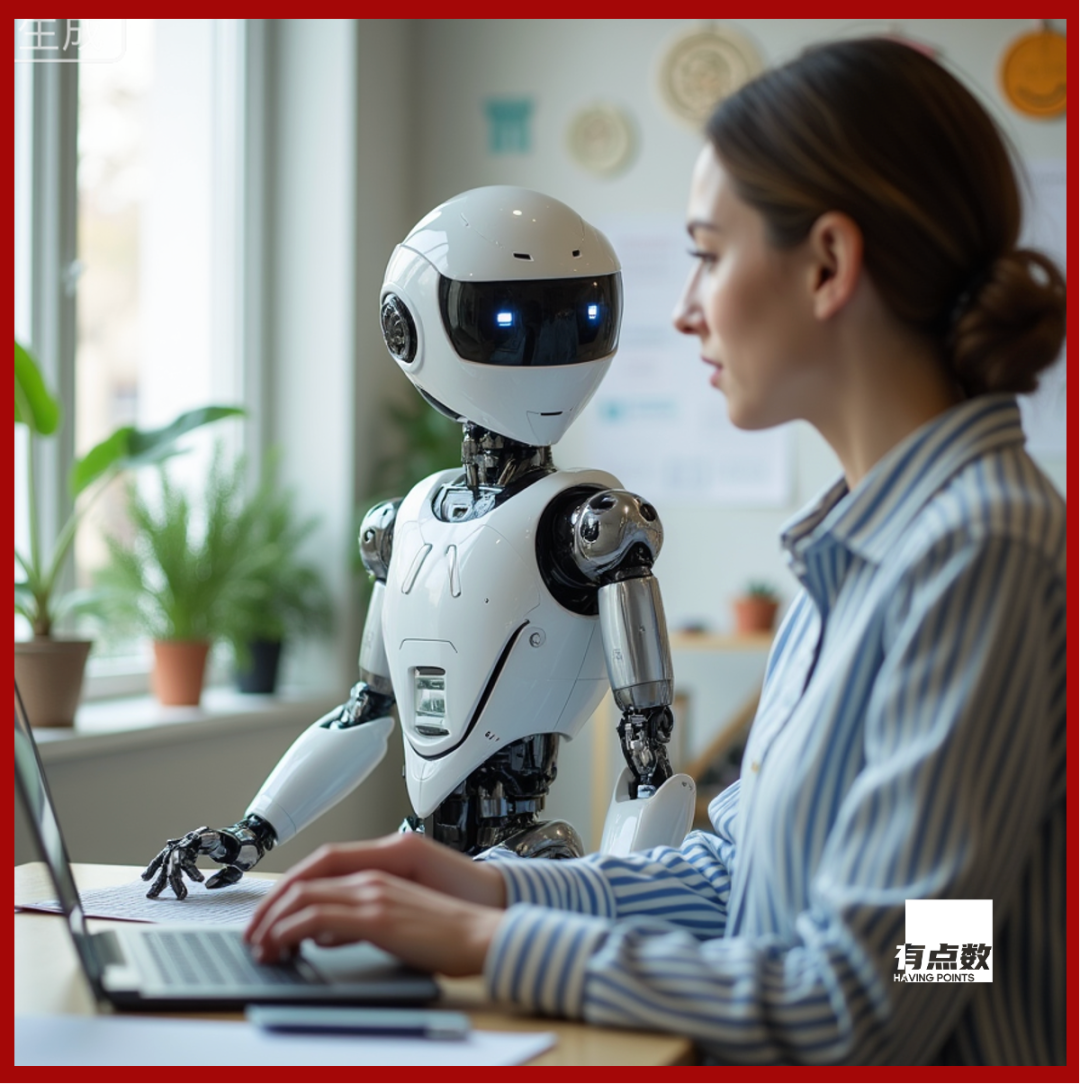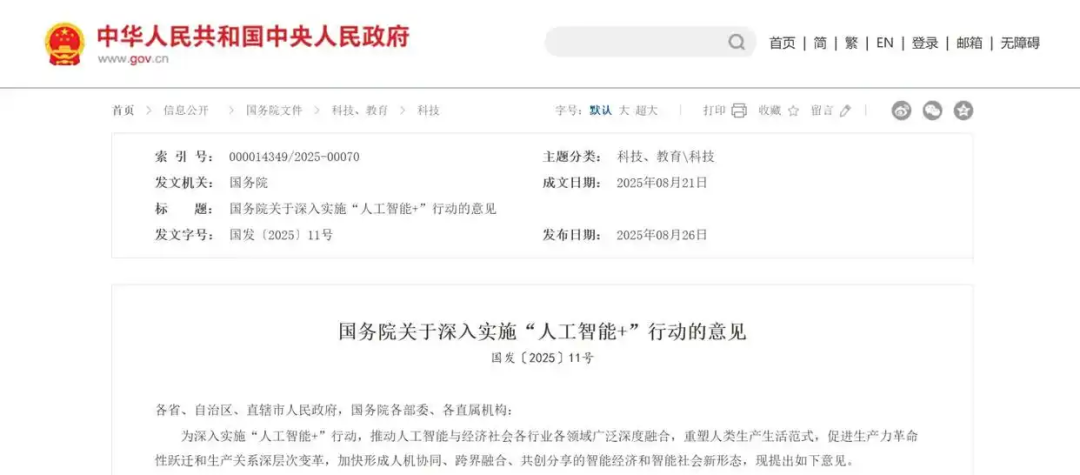How AI Will Penetrate Every Aspect of Economy and Society by 2035
![]() 09/04 2025
09/04 2025
![]() 589
589

Revolutionizing Business Models with AI
Original by Youdianshu Digital Economy Studio
Author | Youshu
WeChat ID | yds_sh
How pivotal will AI be in the future? The State Council recently issued a dedicated policy document to address this.
The "Opinions on Implementing the 'AI+' Action Plan" outlines a clear roadmap for the advancement of 'AI+'. By 2027, China aims to achieve deep integration of AI with key industries; by 2030, the smart economy will become a vital growth engine for China's economic development; and by 2035, China will fully embrace a new era of smart economy and smart society development. This is not merely a general industry guidance document; for the nation, industries, and individuals alike, AI can be considered the paramount development opportunity of the next decade. Are you prepared?

Intelligent Native: Revolutionizing Business Models
In November 2022, ChatGPT emerged, igniting a wave of enthusiasm for generative AI. However, China had already been laying the groundwork for industrial layouts and policy guidance in AI – the first independent document on AI can be traced back to the "New Generation AI Development Plan" in 2017. The "AI Governance Principles" released in 2019 shifted the focus to "harmony, fairness, inclusivity, and sharing", ensuring that AI progresses swiftly and responsibly from the perspective of industry governance.
The core of the 2025 'AI+' policy lies in the integration of six key areas: technology, industry, consumption, people's livelihood, governance, and global cooperation. The emphasis is no longer solely on the technology itself but on how to comprehensively embed AI into every facet of the economy and society – fostering widespread and deep integration of AI with various industries and sectors, reshaping human production and lifestyle paradigms, and catalyzing revolutionary leaps in productivity and profound changes in production relations.
What does this transformation signify? It indicates that AI has evolved from being a "lab-based black technology" to becoming an "integral part of national infrastructure". Much like electricity and the internet in the past, it is no longer the exclusive domain of a single industry but a fundamental capability that all industries must embrace.
This transformation is epitomized by a key term in the document: intelligent native, referring to "enterprises whose underlying architecture and operational logic are inherently based on AI". This marks a fundamental shift in our understanding of the AI development trajectory. Previously, the approach was to use AI to transform existing businesses, such as banks utilizing AI for risk management, manufacturing using AI for quality inspection, and retail leveraging AI for recommendations. This was the concept of AI empowering traditional industries.
However, intelligent native enterprises differ. They are new entities that build AI as a core component from the very inception of their code. Take automakers as an example. Traditional automakers install intelligent driving systems onto existing models, whereas new-force automakers like Li Auto, NIO, XPeng, and Xiaomi design intelligent driving as a core competency from the outset, shaping the entire product architecture around it.
Just as mobile-native apps like WeChat and Douyin disrupted numerous PC-era products during the mobile internet era, these intelligent native companies will undoubtedly create novel user experiences and value creation methodologies, disrupting today's business models. It can be argued that in the intelligent society, the enterprise that successfully transitions to being "native" first will have the authority to set the standards for the next generation of industries.
Inclusive and User-Friendly: Popularizing Professional Services
AI's enhancement to the socio-economy does not hinge on the prowess of top algorithms but on its impact on industrial development and the convenience it provides to everyday life.
This document provides the initial path for the intelligent transformation of all elements across the primary, secondary, and tertiary industries: accelerating the application of AI in all aspects of the industrial field, encompassing design, pilot testing, production, service, and operation; fully integrating AI into breeding, agricultural machinery, and agricultural management in the agricultural sector; and evolving the service industry towards a hybrid model of "unmanned + manned".
For instance, in the mobile internet era, farmers could use their phones to check field temperatures, wind directions, and water levels, then decide on farming strategies and actions. In the intelligent era, these identifications, judgments, and actions can be autonomously handled by AI, based on historical data and large model capabilities, without any manual intervention.
In the service industry, AI will also bring about more efficient transformations. For example, AI lawyers can assist in drafting contracts and analyzing case files. AI financial analysts can monitor global markets round-the-clock. Behind this lies the "democratization" of professional services. In the past, only large companies could afford expensive professional services, but in the future, ordinary individuals will also be able to access them at a lower cost through AI.
Here, it's noteworthy that the term "inclusive" appears multiple times in the document: from "promoting inclusive and user-friendly intelligent computing power supply" to "facilitating intelligent inclusion in urban and rural areas", to "establishing an open ecosystem for AI capability development that is equitable, mutually trusting, diverse, and win-win". The entire document emphasizes making AI affordable and accessible to everyone.
Inclusivity is first evident in the consumer sector, where we will "vigorously develop a new generation of intelligent terminals such as intelligent connected vehicles, AI smartphones and computers, intelligent robots, smart homes, and wearable devices". What are these new-generation intelligent terminals? They are devices that comprehend your intentions and proactively serve you. Current smartphones still require you to click on apps, but future AI phones may assist you in completing various tasks and provide intelligent personal assistant services directly through voice interaction.
Future intelligent agents will not merely be tools that answer your questions but partners that offer solutions to achieve your goals. They will become our "avatars" in the digital realm, representing us in managing vast amounts of information and tasks.
In education, we will "innovate new models of human-machine collaborative education and teaching, such as intelligent learning companions and intelligent teachers", to promote "large-scale individualized instruction". This implies that each student may have a dedicated AI teacher that tailors teaching content based on individual learning characteristics and progress.
For the healthcare sector, we will "explore and promote high-level resident health assistants accessible to all". In the past, high-end medical resources were only accessible to a select few, but AI has the potential to democratize quality medical services. Through wearable devices, AI can monitor your health data in real-time and provide early warnings of disease risks. AI's capability to analyze medical images has surpassed human experts in numerous scenarios, which can significantly compensate for the shortage of medical resources at the grassroots level.
Progress in these areas will not only enhance people's well-being but also profoundly promote social equity.
Going Global: Realizing Overseas Opportunities
Among the six key actions, "AI + Science and Technology" is prioritized, ahead of industrial development and consumption quality improvement. This underscores China's aim to achieve true autonomy and controllability in the underlying technology of AI, and to cease relying on others for core technologies while being active at the application level.
A recent report in The Wall Street Journal highlighted that users in Europe, the Middle East, Africa, and Asia, including multinational banks and public universities, are increasingly opting for large language models from Chinese companies as alternatives to American products like ChatGPT. A study on global competitiveness in key technologies released by Harvard University researchers in early June pointed out that China has advantages in two key components of AI – data and human capital – which are aiding its catch-up.
For countries worldwide, the emerging AI trajectory is relatively equitable. Although the United States leads, its advantage is not substantial. Some leading Chinese AI companies can even gain more ground by open-sourcing their large models, as open-sourcing allows users to freely modify the models to suit their needs, encouraging global developers and enterprises to adopt Chinese models.
Computing power is an indispensable basic "energy" for AI development. The continuous consolidation of China's computing power base gives us confidence as we enter the AI era. As of the end of June 2025, China's total computing power ranked second globally, and its digital infrastructure is already at the forefront of the world in terms of scale and technology. While many developed countries are still transitioning from 4G to 5G, as of the end of June this year, China had a total of 4.55 million 5G base stations and 226 million gigabit broadband users, and has already commenced research and development of 6G.
Just as the internet connects the world, the evolution of AI will inevitably have an international dimension. We will "establish an open ecosystem for AI capability development that is equitable, mutually trusting, diverse, and win-win" and "assist global southern countries in strengthening their AI capabilities". This signifies that China will assume greater international responsibilities in the field of AI and will also bring forth more opportunities for international cooperation.
China's proposal to aid these countries in building AI capabilities is essentially constructing an AI technology export system with China at its core. This will not only help expand the international influence of China's AI technology but also create immense overseas market opportunities for Chinese AI enterprises. For example, iFLYTEK's latest financial report for the first half of 2025 reveals that its overseas AI hardware sales surged by more than three times year-on-year, and its AI office notebook became the top-selling tablet on Japan's largest crowdfunding platform within two months of its launch, as well as the best-selling product across all categories on South Korea's Wadiz platform in 2025.
Faced with AI that iterates at an accelerated pace, it's difficult to fathom the scenario in just three to five years, let alone a decade. This is not merely technological progress but a comprehensive transformation of production methods, lifestyles, and governance models. As stated in this policy document, we must "ensure that all people share the benefits of AI development". For each of us ordinary individuals, this not only implies new tools and experiences but also novel learning directions and potential job opportunities.
THE END
This article is an original contribution by Youdianshu and cannot be reproduced in any form without permission.







